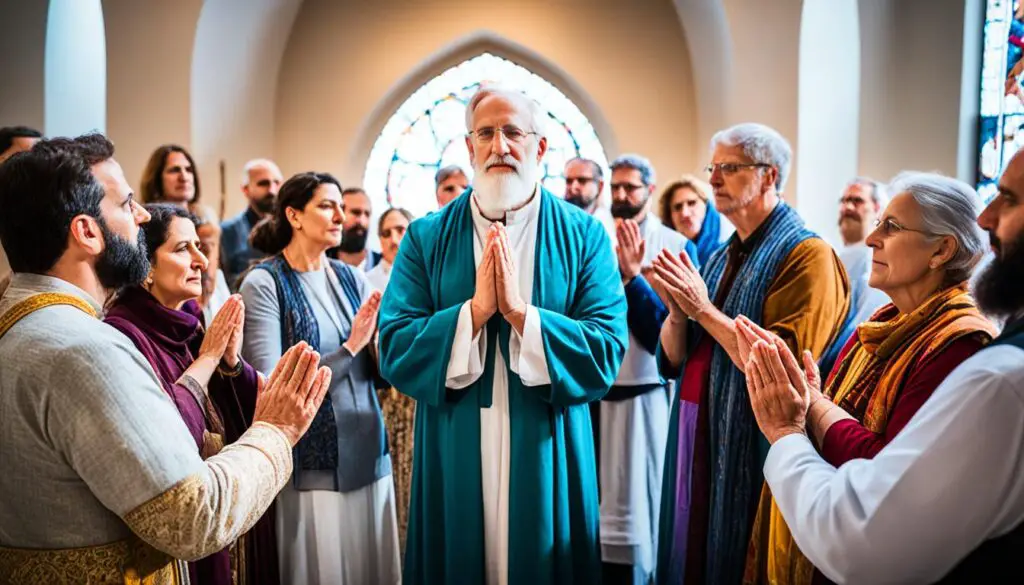Collaborative worship planning has become increasingly significant in Christian communities, as it harnesses the power of collaboration to enhance worship experiences. Initially met with skepticism, the idea of joining forces to plan worship services has proven to be a transformative approach. This shift towards collaborative worship planning has fostered unity, conversation, and creativity within congregations.
Various methods and opportunities for collaboration have been implemented to create shared decision-making in worship planning. Through one-on-one discussions, staff meetings, and strategic planning sessions, congregations have found ways to come together and collectively shape worship experiences that resonate with their members.
Key Takeaways:
- Collaborative worship planning enhances worship experiences by leveraging multiple perspectives and ideas.
- Methods such as one-on-one discussions and strategic planning sessions facilitate shared decision-making in worship planning.
- Collaborative worship planning fosters unity and creativity within congregations.
- Embracing collaboration in worship planning allows for the exploration of innovative worship experiences.
- United Church of Christ actively participates in both ecumenical and interfaith relations to pursue unity in a diverse religious landscape.
Protecting Worship Spaces: A Collaborative Effort
In recent years, worship spaces of various faith communities have unfortunately become targets of violence and hate crimes. These disturbing incidents have prompted religious leaders from different denominations to unite in a collaborative effort to ensure the safety of their congregations.
Recognizing the urgency and importance of protecting worship gatherings, faith-based organizations and interfaith coalitions have emerged to address this critical issue. Through collaboration, these groups are working together to equip houses of worship with the necessary security measures to prevent and respond to threats.
This collaborative approach to protecting worship spaces has resulted in the exchange of expertise, ideas, and best practices in security. By sharing knowledge and resources, religious communities are creating a collective effort to promote safety and safeguard the worship community.
Examples of Collaborative Initiatives
Collaborative efforts in securing worship spaces encompass a wide range of initiatives aimed at enhancing safety and fostering a sense of peace and unity. These include:
- Training Programs: Collaborative training programs have been developed to educate religious leaders and congregants on emergency preparedness, threat assessment, and crisis response protocols.
- Guidance on Grant Applications: Practical guidance is provided to assist religious communities in navigating the complex process of applying for grants and funding to enhance security measures.
- Practical Safety Measures: Collaborative efforts have resulted in the development of comprehensive guidelines and resources, offering practical safety measures that worship leaders can implement to protect their congregations.
Through these initiatives, collaborative worship ideas are transformed into tangible actions, reinforcing the importance of innovative worship experiences that prioritize security and create a safe space for worshipers.
It is crucial to remember that these measures not only protect the physical worship space but also serve to safeguard the spiritual well-being and emotional comfort of worshipers. By working collaboratively, faith communities are sending a powerful message of unity, resilience, and care for one another within their worship spaces.

As we continue to witness acts of violence targeting places of worship, it is essential to recognize that protecting worship spaces is not only the responsibility of individual religious communities but requires a collective effort. Collaboration among faith-based organizations and interfaith coalitions is instrumental in fostering a safe and secure environment for worship gatherings, ensuring that the worship community remains a sanctuary for all.
Embracing Interfaith Dialogue and Engagement
At the United Church of Christ, we are committed to fostering unity in the Body of Christ through active participation in both ecumenical and interfaith relations. Our church recognizes the value of collaborative worship experiences and understands that God speaks to individuals of different faith traditions. We affirm the worth of all people and strive to build connections and foster understanding among diverse religious communities.
Through our full communion agreements with other denominations and engagement with various ecumenical bodies, we actively pursue unity in the ever-evolving landscape of Christianity. Our commitment to collaborative worship planning extends beyond our own community, as we seek to create shared worship experiences with others.
To further embrace interfaith dialogue and engagement, we actively engage in meaningful conversations and partnerships with representatives from different religious traditions. By engaging in respectful discussions and learning from one another, we can deepen our understanding of different faiths and create meaningful connections that transcend religious boundaries.
“In a world where division and misunderstanding often prevail, interfaith dialogue allows us to discover our shared values and the beauty of diversity. Through honest and open conversations, we can deepen our spiritual experiences and foster genuine connections.” – Reverend Sarah Thompson, United Church of Christ
Our commitment to interfaith dialogue goes beyond words to action. We actively participate in interfaith events, workshops, and seminars, where we can engage in deep conversations and build relationships with those of different religious backgrounds. These collaborative efforts allow us to create transformative worship experiences that celebrate our shared values and promote peace and understanding.
Fostering Unity Through Worship Collaboration
Collaborative worship experiences are powerful catalysts for unity and spiritual growth. By joining together in worship, individuals from different faith traditions can experience the richness of diverse practices, rituals, and expressions of faith. Through worship collaboration, we can explore new ways of worshiping and deepen our understanding of God’s presence in our lives.
To facilitate worship collaboration, the United Church of Christ provides resources, toolkits, and training for worship planners and leaders. These resources offer practical guidance on incorporating elements from different faith traditions, creating inclusive worship spaces, and fostering meaningful connections among worshippers.
Building Bridges Through Interfaith Practices
Interfaith practices offer opportunities to bridge the gap between different religious traditions and promote understanding and respect. At the United Church of Christ, we actively encourage the exploration of interfaith practices, such as shared prayers, meditation, and sacred rituals.
By embracing interfaith practices, we can create worship experiences that transcend denominational boundaries and focus on our shared humanity. These collaborative worship gatherings allow individuals to learn from one another, deepen their faith, and develop a broader understanding of spiritual practices.
Benefits of Interfaith Dialogue and Collaboration
| Benefits | Description |
|---|---|
| Enhanced Spiritual Growth | Interfaith dialogue and collaboration provide opportunities for individuals to expand their spiritual understanding and experience transformative growth. |
| Promotion of Peace and Understanding | Engaging in interfaith dialogue fosters mutual respect, promotes peace, and combats ignorance and prejudice. |
| Celebration of Diversity | Collaborative worship experiences recognize and celebrate the diverse expressions of faith, showcasing the beauty of religious diversity. |
| Deeper Connections | Interfaith collaboration fosters meaningful connections and relationships among individuals from different religious traditions. |
Embracing interfaith dialogue and engagement is essential for nurturing unity, fostering understanding, and promoting peace in our ever-diverse world. Through collaborative worship experiences, shared practices, and conversations, the United Church of Christ remains dedicated to creating an environment where individuals from all faith backgrounds feel welcome and valued.

Resources and Partnerships in Interfaith and Ecumenical Relations
The United Church of Christ (UCC) is dedicated to fostering collaboration and dialogue in the realm of worship and interfaith engagement. To achieve this, the UCC has established partnerships with several reputable organizations and maintains relationships with esteemed ecumenical bodies. Through these connections, the UCC actively promotes interfaith collaboration and dialogue, contributing to the development of innovative worship experiences and the formation of a strong worship community.
One of the key partners of the UCC in interfaith collaboration is Religions for Peace USA. This organization works towards fostering understanding and cooperation among different religious communities, with a focus on peacebuilding efforts. The UCC’s partnership with Religions for Peace International further extends the reach of their interfaith initiatives on a global scale. Together, these organizations strive to cultivate an environment conducive to collaborative worship planning and encourage the exchange of ideas and practices.
The UCC also collaborates with the Parliament of World Religions and Shoulder to Shoulder to promote interfaith dialogue and engagement. The Parliament of World Religions is a renowned platform that facilitates discussions and fosters relationships among diverse faith traditions. Through its partnership with Shoulder to Shoulder, an organization working to end anti-Muslim sentiment, the UCC actively supports the ideals of interfaith solidarity and mutual respect.
Aside from interfaith collaborations, the UCC recognizes the importance of maintaining strong relationships with ecumenical bodies. These connections facilitate the exchange of ideas and resources, contributing to the overall enrichment of worship experiences and the strengthening of the worship community. The UCC’s relationships with esteemed organizations such as the World Council of Churches, World Communion of Reformed Churches, and National Council of Churches highlight its commitment to ecumenical progress and unity.
Resources for Interfaith Engagement
In addition to partnerships, the UCC provides valuable resources and toolkits for interfaith engagement. These resources are designed to equip worship communities with the necessary knowledge and guidance to engage in productive interreligious dialogue and collaboration. Some of these resources include:
- Guides for interreligious dialogue, facilitating meaningful conversations that promote understanding and respect among diverse faith traditions.
- Case studies showcasing successful examples of interfaith collaboration in worship planning and community engagement.
- Forums for discussions, providing a platform for worship leaders and community members to share their experiences, insights, and challenges in collaborative worship.
These resources serve as valuable references for worship planners and community leaders, offering practical guidance and inspiration for implementing collaborative worship ideas and fostering innovative worship experiences.

| Partnerships and Organizations | Description |
|---|---|
| Religions for Peace USA | An organization dedicated to fostering interfaith collaboration and peacebuilding efforts within the United States. |
| Religions for Peace International | A global platform that promotes interfaith dialogue and cooperation on an international scale. |
| Parliament of World Religions | An institution that facilitates interfaith discussions, fostering relationships and understanding among various faith traditions. |
| Shoulder to Shoulder | An organization dedicated to ending anti-Muslim sentiment and promoting interfaith solidarity. |
| World Council of Churches | A fellowship of churches from different denominations working towards unity, justice, and peace. |
| World Communion of Reformed Churches | An association of Reformed churches worldwide, fostering ecumenical relations and collaboration. |
| National Council of Churches | A council comprising diverse Christian traditions, promoting unity and addressing social justice issues. |
Conclusion
Collaborative worship experiences have the power to bridge communities and enrich the spiritual lives of individuals. By embracing collaboration, worship planners can tap into a wider range of ideas, creativity, and perspectives, resulting in innovative worship experiences that resonate with congregations. Through the collaboration, different religious communities can come together in worship gatherings, fostering unity and understanding.
Moreover, interfaith and ecumenical relations play a vital role in enhancing the impact of collaborative worship. By engaging in dialogue and actively seeking connections with other faith traditions, the shared faith movement can grow, enabling the United Church of Christ to foster collaboration and dialogue in worship planning and interfaith engagement.
As we look to the future, it is important to continue embracing collaborative worship experiences, recognizing their potential to break down barriers and build bridges between communities. By coming together in worship, we can create meaningful connections and celebrate the diversity of our faith traditions, ultimately strengthening our collective spiritual journey.
FAQ
What is collaborative worship planning?
Collaborative worship planning is the process of bringing individuals together to plan and create worship services, allowing for shared decision-making, creativity, and a wider range of perspectives.
Why is collaborative worship planning important?
Collaborative worship planning enhances worship experiences by tapping into a collective pool of ideas, fostering unity, and creating innovative worship experiences that bridge communities.
How can worship planners foster collaboration?
Worship planners can foster collaboration through methods such as one-on-one discussions, staff meetings, and strategic planning sessions, encouraging conversation and shared decision-making.
How can faith communities protect their worship spaces?
Faith communities can protect their worship spaces through collaborative efforts that involve sharing expertise, implementing security measures, and participating in training programs.
How does the United Church of Christ promote unity and collaboration?
The United Church of Christ actively participates in ecumenical and interfaith relations, maintaining relationships with other denominations and engaging in dialogue and partnerships with various organizations.
What resources are available for interfaith engagement?
The United Church of Christ provides resources such as guides for interreligious dialogue, case studies, and forums for discussions to facilitate interfaith engagement and understanding.
How can collaborative worship experiences promote unity among different religious communities?
Collaborative worship experiences promote unity among different religious communities by fostering mutual respect, understanding, and cooperation through shared worship planning.








